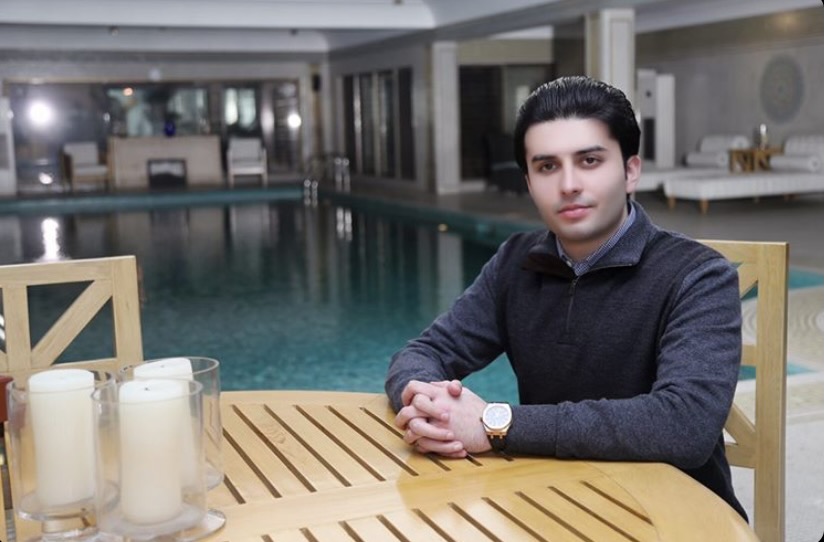Lifestyle
Asghar Akhtar Khan – a Pepsi heir, Going into Organic Skincare

One of the brightest business talents of the Middle East, Mr. Khan is concentrating all his time, retail experience and efforts into his current start up Bio Lab Exotique. He has launched this with the glamorous Ollia Tzarina, who is known for her ex fashion label Tzarina By Ollia, that dressed everyone from Beyonce to Kim Kardashian, and for being named a ‘Bond Girl’ by Forbes Italy.

So why the switch to organic skin care? What does Bio Lab Exotique brand have that other brands on the market don’t?
By looking deeper into the brand, its pretty evident- everything is unique.
First of all, the brand is completely chemical free. It doesn’t even use ingredients that prolong the shelf life. Therefore the products must be used quick, within 3 months and re purchased.
Second – the products are mixed and made in a high tech lab in the mountains of Atlas, that is in Morocco, where the brand grows and harvests its own precious oils such as neem, argan and prickly pear (one of the most expensive oils in the world).
Third- the brand is going exclusively wholesale, so you can buy it globally in pharmacies, department stores, resorts and spas.
We specifically are intrigued by the promises: Bio Lab Exotique promises visible effects after 48 hours, and can treat conditions such as: skin conditions, psoriasis, eczema, uneven skin tone, dull hair, acne. And fun part? The brand is trying to give us all a ‘filtered Instagram look’, naturally. The price is great as well- 40 USD, and the brand looks very much Tom Ford-esque that will of course look fab seating on every vanity table.
I say we give it a go, I am definitely a massive supporter of all things organic and effective. And I certainly would trust two people that are known for bringing the world value.
Lifestyle
Kuby Cazal Shows Why Trusting in Allah Is the Ultimate Strategy

In an online world where entrepreneurship is often measured in Rolexes, rented Lambos, and airport selfies, Kuby Cazal stands out — not because he’s louder, but because he’s real.
He doesn’t flash his wealth. He doesn’t post luxury for the sake of validation. In fact, he’s said in several interviews that he doesn’t want to be known as the guy who flexes with money.
Instead?
He flexes with faith.
Kuby Cazal is a practicing Muslim — and for him, business isn’t just about profits and success. It’s about gratitude, growth, and fulfilling the responsibilities that come with the blessings Allah has given him.
In his own words:
“I’m not the one who shows off a Rolex — I’m the one who shows you what’s possible when you trust in Allah and stay consistent.”
And it shows. While others post stories of flashy lifestyles, Kuby’s focus is on impact. He prays. He fasts. He makes dua for his team. And he constantly reminds his audience that everything he has is from Allah — not from his own effort alone.
Behind the scenes, he’s helped countless dropshippers quietly. No screenshots. No clout. Just support. His message is simple: you can build a business and stay true to your deen.
But it wasn’t always this way. Kuby Cazal himself admits that a few years ago, his connection to Islam wasn’t where it should’ve been. “I prayed sometimes, I skipped sometimes,” he shares. “Now I don’t skip. Because everything I have, everything I am — it’s from Allah. Why would I ever miss thanking Him?”
In a world full of noise, Kuby Cazal is a different kind of entrepreneur. One who doesn’t point to himself as the source of success — but to Allah.
For young Muslims trying to navigate business and faith, he’s proof that you don’t have to sell your soul to build something meaningful. You can work hard, stay humble, and always keep Allah first.
And in Kuby’s case? That’s the biggest flex of all.
-

 Tech4 years ago
Tech4 years agoEffuel Reviews (2021) – Effuel ECO OBD2 Saves Fuel, and Reduce Gas Cost? Effuel Customer Reviews
-

 Tech6 years ago
Tech6 years agoBosch Power Tools India Launches ‘Cordless Matlab Bosch’ Campaign to Demonstrate the Power of Cordless
-

 Lifestyle6 years ago
Lifestyle6 years agoCatholic Cases App brings Church’s Moral Teachings to Androids and iPhones
-

 Lifestyle4 years ago
Lifestyle4 years agoEast Side Hype x Billionaire Boys Club. Hottest New Streetwear Releases in Utah.
-

 Tech7 years ago
Tech7 years agoCloud Buyers & Investors to Profit in the Future
-

 Lifestyle5 years ago
Lifestyle5 years agoThe Midas of Cosmetic Dermatology: Dr. Simon Ourian
-

 Health6 years ago
Health6 years agoCBDistillery Review: Is it a scam?
-

 Entertainment6 years ago
Entertainment6 years agoAvengers Endgame now Available on 123Movies for Download & Streaming for Free
